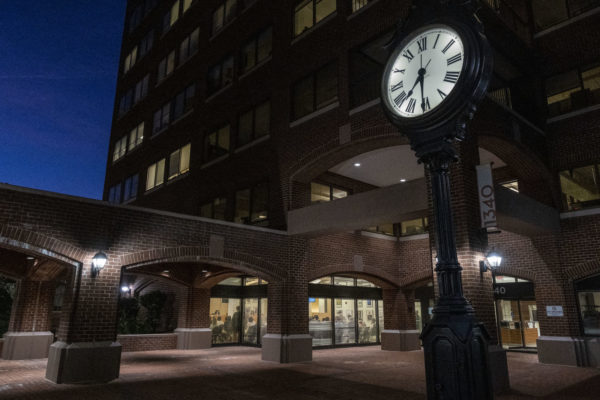
(Updated 4:20 p.m.) Alexandria’s School Board is meeting tomorrow for a seemingly innocuous budget revision, but city leaders say the truth is the School Board is walking back a potentially illegal decision made without communicating with the City Council.
Like previous work sessions, a joint City Council/School Board meeting became tense as the discussion turned to funding. The fiscal year 2024 combined funds budget for Alexandria City Public Schools (ACPS) details the revenues and expenditures.
The one-page document has a breakdown of the operating budget for the upcoming FY 2024 school year:
The FY 2024 Operating budget in the amount of $333,442,978 for both revenues and expenditures. This includes other financing sources and uses, as well as a planned use of general fund balance in the amount of $8,722,578, including a transfer out to the Capital Improvement Program of $1,966,021…
One note at the bottom of that section, however, put ACPS in hot water.
The $1,966,021 transfer to the CIP shall be contingent upon the following actions from the City of Alexandria:
- The summer youth employment program grows to a minimum of 200
participants- A partnership with ACPS is established to provide a minimum of 150 students
with employment- Explore increasing the salary for the program from $12/hour to at least $15/hour
to ensure the Alexandria livable wage is met
“There is some language that is technically impossible and inappropriate and so we want to do the adjustments to that motion prior to July 1 so that we are in compliance with our budget expectations and needs,” said School Board Chair Meagan Alderton. “Essentially: the way that the motion reads there are concerns about the use of the word contingency.”
The conditions could be interpreted as holding the funds hostage pending policy decisions from the City of Alexandria, but ACPS officials said that wasn’t the intent. Alderton said the issue came down to a miscommunication between the School Board and the City Council.
“We would be removing language around a contingency for CIP funds which makes it seem like it’s in exchange for our school system and ACPS students having access to youth employment programs,” Alderton said.
A revised version of the fiscal year 2024 combined funds budget excludes the conditions, but at the joint meeting, members of the City Council said they were frustrated and concerned about how the language made it that far through the budget process.
“I’ll put aside the legal aspect for this for a second, which is not insignificant, but this is unfortunate,” said Mayor Justin Wilson. “I appreciate that it’s getting corrected quickly… This was something that in 13 budgets I’ve been a part of I’ve never seen anything like this.”
Wilson said the issue was also raised frustratingly late, with city leaders only being made aware of the contingency on the day of their meeting.
City Council member John Chapman said the contingency and the last-minute meeting to reverse it is further indicative of the strained communications and relationship between the School Board and the City Council.
“I’m trying not to play this up too much, but I think this, along with other conversations we’ve had in this room, seems to be a regular misunderstanding about our respective positions and relationship to each other as different bodies,” Chapman said.
Alderton also raised the possibility of ACPS switching to a revenue-sharing agreement, like Arlington County. Under a revenue-sharing agreement, a percentage of the tax revenue goes directly to the school system rather than being allocated as part of the municipal budget.
“I want to put my plug in for the revenue sharing agreement,” Alderton said. “I know it definitely has to be talked about… I do wonder if a revenue-sharing agreement is a more mature way for us to handle this as a city because it’s difficult for cities where you have a budget as a city and to have the tension about what goes where is challenging. It seems to work in other places.”
Chapman responded that the current conflicts and miscommunications don’t bode well for ACPS responsibly managing a revenue-sharing agreement.
“It can work here as it seems to work in other places, but this example perfectly fits why we are not there yet,” Chapman said. This example highlights why we’re ways away. We have not established systematic communication channels to make sure we are communicating properly and timely and speaking the same language even when we disagree… Folks basically went around Council. They didn’t engage any of the members of the Council and the Mayor just found out. That’s taking several steps back.”

Alexandria City Manager Jim Parajon’s $884.3 million fiscal year 2024 budget was unanimously approved by City Council Wednesday night (May 4), backing citywide pay increases, a fully funded school system and collective bargaining agreements with the police and fire departments.
While the real estate tax rate remains unchanged at $1.11 per $100 of assessed value, city residents will have to pay $308.70 annually for the stormwater utility fee — an increase from $294 last year. The budget, which goes into effect July 1, is an increase of 5.4% over last year’s $839.2 million budget. About 47% of it ($398 million) is dedicated to paying the salaries of 2,765 city employees.
“You’re seeing some some very historically significant investments in public safety,” Mayor Justin Wilson said. “This budget is the first that is informed by the results of two very large collective bargaining agreements.”
City Council Member Kirk McPike said that funding the collective bargaining agreements will help the city fight rising crime.
“Our public safety officers should feel confident that this council has their backs and will continue to invest in these important services,” McPike said. “Those in our city who are worried about the recent rise in certain types of crime (should) take heart that we hear and share your concerns. We’re putting financial resources into ensuring that our police department has the officers and equipment it needs to address this challenge.”
The budget provides:
- A 7% market rate adjustment for sworn fire, medics and fire marshals
- A 6% market rate adjustment for sworn police and Sheriff’s Deputies
- A 2% increase in General Schedule and Sheriff’s Deputy pay scales
- A $4.5% market rate adjustment for non-public safety personnel
- Three new steps in the general pay scale, which is a 7% increase in salary potential
- 25 SAFER grant-funded firefighters
- Funding for Commonwealth’s Attorney staffing for more than $600,000 toward the APD body worn camera program, which launched in April
Parajon faced a $17 million budget shortfall when he started crafting the budget, but it was wiped away by unexpectedly high real estate assessments and $4.6 million in citywide efficiency reductions. He asked all departments for 1.5%-to-2% in budget reductions, with efficiencies like the outsourcing of city employee leave of absence reviews, benefits consulting, and city vehicle fleet repair.
“This adopted budget invests in helping our residents and businesses become more prosperous, safer, more engaged while investing in the infrastructure of our City, and investing in our future with climate action, education, housing and our youth,” Parajon said.
City Council Member Alyia Gaskins says that the budget sends a message to first responders and residents.
“I believe that we are saying to our staff in our fire and police departments that you matter to us,” she said. “We’re saying to our residents that we are committed to recruiting and retaining the best talent to keep you safe through fully funding the operating budget for our schools, and increasing investments in our summer youth employment program, as well as finding ways to waive summer fees for our lowest income residents at our rec centers. We are saying to our young people that you matter to us and we are committed to doing all we can to help you thrive.”
The budget also fully funds the Alexandria City Public Schools $258.7 million operating funds budget request, which will provide 2,600 ACPS employees with a 3% step increase. The request is a 4% increase ($9.9 million) over the FY 2023 budget.
“We have stretched the dollar and been able to keep our tax rate level,” Vice Mayor Amy Jackson said. “Close to a third of our budget is dedicated to our schools.”
Parajon’s budget also provides $2.4 billion in funding for the 2024-2033 Capital Improvement Program, of which $360,788,867 is dedicated for FY 2024.
Funded capital projects this next fiscal year include:
- $282.1 million for the city’s stormwater management systems
- $185.1 million for the Washington Metropolitan Area Transit Authority’s capital improvement program
- $65.6 million to support infrastructure improvements to be construction by the developer at the Landmark Mall site.
- $63.3 for citywide street reconstruction and repaving
- $48.2 for capital infrastructure improvements associated with the Waterfront Implementation Project
- $17.4 million to renovate Four Mile Run Park
Wilson said he’s in favor of a shorter budget process. This year, the City Manager presented his budget proposal in February, followed by two-and-a-half months of City Council work sessions and meetings.
“I will note this was a shorter process,” Wilson said. “Nobody seemed to miss the extra weeks that were part of the process. So, it might give us a path to even further shorten it in the future.”
Last night, the Alexandria City Council unanimously adopted the City’s FY24 Budget. Mayor @justindotnet said “Our budget is evidence of our commitment to the needs of our community.” Learn about how the City is investing in our residents and community: https://t.co/IXlI3piG8b pic.twitter.com/dZL0gULTkk
— AlexandriaVAGov (@AlexandriaVAGov) May 4, 2023
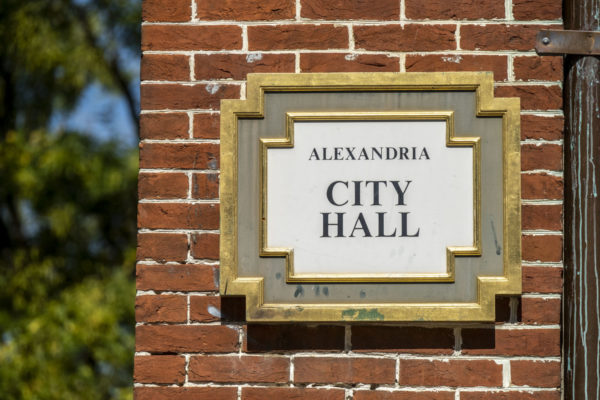
Personal security cameras, speed cameras in school zones, summer youth employment programs and eviction prevention funding are just a few of the final additions included in the fiscal year 2024 budget by the Alexandria City Council on Tuesday.
Council approved funding a $20,000 program to encourage businesses and homeowners with a “small incentive” to set up security cameras to deter crime, as well as increase their coordination with the Alexandria Police Department.
“I like the concept,” Mayor Justin Wilson said. “I think we want our residents to partner with us in providing this kind of neighborhood visibility.”
Other additions include $490,000 for five speed cameras at school crossing zones around the city. Last year, Council approved $400,000 for the speed camera program in five school zones.
Not all of the requests made the final cut. Vice Mayor Amy Jackson’s request to give the Alexandria Commission for Women $20,000 for it’s 50th anniversary event failed to gain consensus.
Council also took $657,629 from the budget that was intended for the Northern Virginia Juvenile Detention Center (200 S. Whiting Street), pending proposals from City Manager Jim Parajon to find alternative uses for the facility, pursue regional partnerships for facility use and optimize capacity for the underutilized space.
The full list of additions to the budget are below.
- Out of School Time Program (OSTP) staffing ($200,000) — This increases paid leave and benefits for part-time staffing with the city’s Out of School Time program.
- Fee waiver for OSTP participants ($15,000) — This would fund a waiver for program participants eligible for SNAP and TANF.
- Speed cameras in school zones ($490,000) — This adds five photo speed cameras to school crossing zones prioritized by the city’s Department of Transportation and Environmental Services
- Childcare services ($50,000) — This will provide child-minding services at City COuncil town hall events, as well as select board, committee and commission meetings.
- Additional eviction prevention funding ($150,000) — This would increase the current funding level of $100,000, all of which will “reasonably assist 40 households in FY24,” according to the city.
- Central coordinator for immigrant affairs/refugee settlement ($110,000) — This would explore a new position or series of positions that could advance efforts to connect immigrant communities with information, resources and services and address the city’s challenges with immigrant populations.
- RPCA Mental Health Pilot position ($75,000) — These funds would go toward developing a Department of Recreation Parks and Cultural Activities pilot program for youth mental health services.
- Summer youth employment program ($214,943) — This would expand the program by 50%, to serve 255 children (85 more than the current program).
- Study for local housing voucher program ($250,000) — This would add funding for a study on a voucher-like program that stabilizes housing and enables access for low-income housholds across the city’s private rental market.
- City library security ($70,000) — This funding maintains library security staffing at current levels.
- Department of Aging and Adult Services ($19,000) — This fills the gap created by Virginia budget formula changed related to the Older Americans Act.
- DASH service line expansion on Line 33 ($120,000) — This would expand DASH Line 33 service from once every 60 minutes to 30 minutes on Sundays, easing connections to the new Potomac Yard Metro Station.
- Visit Alexandria advertising ($78,000) — This additional funding can be used by Visit Alexandria for any sort of media, online or print advertising, either regionally or nationally at their discretion.
- City Council aide compensation increase ($5,300) — This is a 2% scale compensation adjustment.
- Private security camera incentive program ($20,000)
- Continuation of AEDP economic recovery manager ($147,208) — The ERPM is responsible for creating and administering AEDPs Business Association Grant program, which supports Alexandria business associations as well as other ARDP rogramming to promote economic recovery.
- Rental inspection program enhancement ($136,000) — This allows staff to evaluate non-compliant multi-family rental properties.
The budget will be approved on May 3 and go into effect on July 1.
The tense discussions between Alexandria’s City Council and School Board came to a head over Alexandria City High School’s Chance for Change Academy.
The joint work sessions are a chance for the school and city leaders to close the $7.5 million gap between the School Board’s $58.7 million request and the City Manager’s proposed $51.3 funding to the schools in the fiscal year 2024 Capital Improvement Program (CIP). But while both sides agreed relations between the two bodies are better than they’ve been in the past, the conversation still reopened old wounds between the two leadership teams.
Among the items discussed was $2 million in improvements to Chance for Change, listed on the Alexandria City Public Schools’ (ACPS) website as “a temporary placement for students whose matriculation in the traditional setting had been disrupted by various circumstances and also, based on a case-by-case basis.”
“I am not recommending we fund Ferdinand Day’s 5th and 6th-floor renovation. I’m not recommending the capacity for the [Chance for Change] lease space,” said City Manager Jim Parajon. “Those are two projects that are $7.5 million dollars. By my estimation, while they are important and needed, there are other considerations in the capital budget that we must do.”
Alicia Hart, chief of facilities and operations at ACPS, said the Chance for Change Academy cannot grow in the confines of its current space, citing a lack of Americans with Disabilities Act compliance, parking issues, and a lack of outdoor space.
“There’s been a lot of discussion about whether or not we can expand alternative education programs, we cannot do that in our current space,” said Hart. “Every project we put forward in the CIP, from a school standpoint, is a priority.”
The comment sparked an intense back-and-forth between City and ACPS leadership.
“Every project being a priority doesn’t work in a CIP that has to be sustained,” said Parajon. “The bottom line is we have to make choices. I have 20-something departments and everyone is a priority, but it doesn’t work that way. It’s really important that we start to readjust how we think about what is the highest priority: because that’s the thing that has to get funded.”
Parajon noted that the Chance for Change funding was not included in the previous CIP.
“I’m not debating the need, what I’m saying is when we sit down — this is where it has to be a common thought process — it has to be an urgent need when in 2025 we have the largest potential debt service we have to incur,” Parajon said. “We can’t just add to that because there’s no fiscal ability to manage that.”
Parajon and city leadership faced some rebuke from ACPS leaders who said the city wasn’t putting the needs of students first.
“What we’re talking about with Chance for Change is children’s lives and children’s educational needs,” said Interim Superintendent Melanie Kay-Wyatt. “Pushing those down the road is going to further impact academic achievement and social-emotional growth, and I think that needs to be seen very differently than maybe another infrastructure like office space. We’re talking about children who are in need of services… Putting that off a year is going to further put them behind.”
School Board chair Meagan Alderton said that while not funding the expansion doesn’t mean the program will go away, it still keeps the program from being what ACPS has in mind.
“Is it going away if we don’t do something?” Alderton said. “I think the answer to that is no, not immediately. Is it meeting the needs for what we want Chance for Change to be? No, it doesn’t. I think it’s a two-sided question.”
But Alexandria City leadership stuck to Parajon and pointed the finger back at ACPS for ignoring the realities of budget crafting. According to Mayor Justin Wilson:
I’m inclined to agree with everything you said. The problem is I just heard it for the first time a couple minutes ago. [Kay-Wyatt] and I meet monthly… this has never been placed on the agenda. I’ve read through the entire operating proposal: there’s a couple glancing mentions of Chance for Change. I can’t even find on your website how many kids are at Chance for Change right now, and trust me I’ve searched and I know your website pretty darn well.
If there is a story to be told about alternative education and a change in policy and a different direction that requires significant capital investment: last time I checked I’m the Mayor of the city and I don’t know anything about it.
This is a conversation we need to have collectively and jointly before something just shows up in a CIP proposal and we’re told tonight horrible things are going to happen to kids if this proposal doesn’t get funded. That should not be the case and that says something is broken in the process.
The argument came at the end of a nearly three-hour meeting where City Council members repeatedly highlighted areas where there had been insufficient progress on long-term planning collaboration.
From ACPS having better access to the permitting facility to ACPS and City of Alexandria staff potentially sharing office space, City leaders said there are opportunities for greater efficiency that have been woefully underexplored. While ACPS staff said progress is being made, City Council members say it’s time to start seeing results.
“I’ve been around too long to say ‘we have the ability to wait,'” said City Council member John Chapman. “I’m very interested in seeing what we can get done in the next three months and the next six months.”
Chapman said that could involve more meetings or more retreats for City and ACPS leadership to hammer out issues together.
“I do think there are still opportunities for us to have bigger retreat-style conversations,” Chapman said. “We’ve tried that in the past and it’s worked. We need to build that in until we’re marching to the same beat. If we think about sports practice or band practice, if they’re not marching to the same beat, the band director is going to make them practice together, and that’s the way we have to look at it.”
At the end of the meeting, Alderton expressed concerns that the discussions between City leadership and the School Board have focused too much on bureaucracy and not enough on improving the quality of education for Alexandria’s student body:
What is being relayed here tonight — should it have been relayed sooner or later — is that that is a facility and only an example of one of many that is not meeting the actual needs of what we would like Chance for Change to be.
If we’re going to be candid, I think a lot of times we talk about a lot of things other than the actual education of the kids. Maybe a solution we need to get to is all of us, every single one of us, talking more about the education of the kids because we get bogged down in so many different things. If we don’t talk about that, I don’t know how that’s going to change. We get bogged down in facilities we get bogged down in philosophies, but we got to understand the educational needs of these kids and I will tear up right here because of it.
You know one thing I always say: what is the number one thing that the slave master wanted to keep away from the slave? A book. The ability to read. We have fought in this community about everything other than that. What I would say is: yes, let’s talk about all the things, but we gotta figure this out.
For Alexandria City Council members, though, the counterpoint is that bureaucracy is what holds the rest of the system together. According to Chapman:
I appreciate your words, I appreciate your passion: the focus has never changed.
The stark reality is: how we’ve been operating is not necessarily tenable into the near future. It’s not sustainable.
After this meeting, I need how to figure out how to fund what ACPS does, but also what DASH does, how to make sure we can have people of different incomes and different age groups in this community. I don’t want you or anyone to think I’m dismissing what you said. It’s powerful and it’s necessary… but I need to make sure that you have the resources… We’re not going to be able to build what we want without good planning and resources.
The FY 2024 budget is scheduled for adoption on May 3.

Alexandria City Manager Jim Parajon released his proposed $881.1 million fiscal year 2024 budget at City Hall on Tuesday night, and it includes an option to raise taxes by 1 cent.
The budget also reflects $8.1 million in collective bargaining agreement funds that will go to the Fire and Police Departments.
Parajon, who presented his budget to City Council, said that unexpectedly high real estate assessments and $4.6 million in efficiency reductions wiped away a projected $17 million budget shortfall.
The budget is a 5% increase over last year’s budget, and Parajon is proposing no change in the real estate tax rate, which would remain at $1.11 per $100 of assessed value for the second year in a row. The same goes for other tax rates, including personal property taxes, which would remain at $5.33 per $100 of assessed value for vehicles and $4.75 per $100 of assessed value for tangible personal property.
Stormwater utility fee rates are, however, projected to increase from $294 to $308.70.
The budget funds the Alexandria School Board’s operating budget transfer request of $258.7 million, which is an increase of $9.9 million, or 4%.
“You’re also going to see a fairly significant emphasis on public safety and first responders,” Parajon told Council.
Parajon is also asking for $500,000 for diverse small business funding. That particular funding request comes after the city recently abandoned a grant program aimed at helping minority business owners after a lawsuit claimed the program was discriminatory against white people.
The budget provides:
- A 7% market rate adjustment for sworn fire, medics and fire marshals
- A 6% market rate adjustment for sworn police and Sheriff’s Deputies
- A 2% increase in General Schedule and Sheriff’s Deputy pay scales
- A $4.5% market rate adjustment for non-public safety personnel
- Three new steps in the general pay scale, which is a 7% increase in salary potential
- 25 SAFER grant-funded firefighters
- Funding for Commonwealth’s Attorney staffing for more than $600,000 toward the APD body worn camera program, which launches in April
Parajon asked all departments for 1.5%-to-2% in budget reductions in their proposals, with efficiencies including the outsourcing of city employee leave of absence reviews, benefits consulting, and city vehicle fleet repair.
The manager is also advising Council to consider an “alternative” 1 cent increase in real estate taxes, which would reduce borrowing for the Alexandria City High School Project, increase city employee compensation and provide an additional pay increase of 1% over what’s being proposed for city and Sheriff’s Office employees.
That 1 cent would also fund:
- An emergency services bed-finder for $79,225
- A new bilingual clinical psychologist to help city employees experiencing trauma for $166,380
- A construction project manager for $212,445
- Out of school time staffing for $200,000
- Summer youth employment expansion for $200,000
Parajon, who also presented a $2.39 billion 10-year Capital Improvement Program (CIP), proposes $367.2 million for Schools capital projects, including $39.5 million in cost escalations for projects currently underway like the George Mason Elementary School project.
The FY 2024-2032 CIP includes:
- $282 million for the city’s stormwater management systems
- $185.1 million for the Washington Metropolitan Area Transit Authority’s capital program
- $63.3 for citywide street reconstruction and repaving
- $48.2 for capital infrastructure improvements associated with the Waterfront Implementation Project
- $17.4 million to renovate Four Mile Run Park
“I certainly look forward to working alongside my colleagues as we spend the next next few months engaging with the community to provide a budget,” said Mayor Justin Wilson.
There will be multiple public forums to discuss the budget, the next being a public presentation by Parajon on Thursday, March 2 at 7 p.m. at Charles E. Beatley, Jr. Central Library (5005 Duke Street), followed by a City Council/School Board budget work session on Wednesday, March 8, and budget public hearings on March 13 and March 18.
The budget will be approved on May 3 and go into effect on July 1.
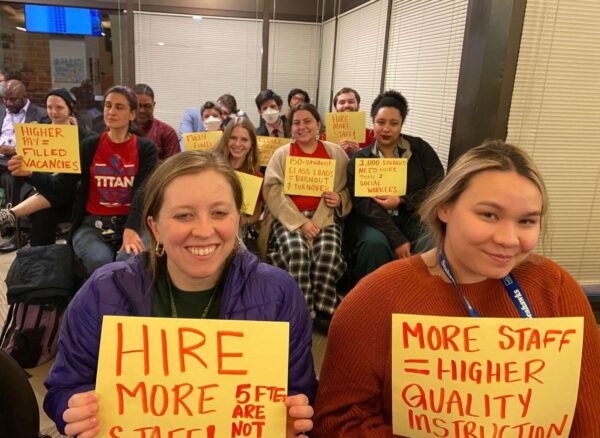
Alexandria City High School teachers are applauding increased wages and other recent changes to the Alexandria City Public Schools’ proposed fiscal year 2024 budget.
The School Board approved the proposed $359.9 million fiscal year 2024 combined funds budget proposal on Thursday night. The budget is a 4% increase over last year’s approved budget and includes funding to develop an official ACPS plan and policy for collective bargaining with employees.
Last month, 15 ACPS teachers appeared before the School Board at its public hearing for Interim Superintendent Melanie Kay-Wyatt’s budget. Since then, the proposed 2.6% step increase for eligible ACPS employees has been increased to 3% and a full step has been eliminated from the pay scale.
The Alexandria City High School budget now includes four new core teachers, a school psychologist, a truancy specialist, a systemwide college and career counselor.
“We are deeply grateful to ACPS for making these needed investments in our schools, staff, and students,” said Jay Falk a teacher at Minnie Howard who organized teachers to the school board meeting. “While there is always more work to do, this historic investment in needed mental health and instructional positions will help address pay and staffing concerns. Thank you to the ACPS leadership and school board members who worked hard to make these investments possible.”
The budget now goes to City Council before being approved as part of the city budget in early May.

Alexandria City Public School teachers are saying that the proposed salary and step increases aren’t enough.
Last Thursday, 15 ACPS teachers appeared before the School Board at its public hearing for Interim Superintendent Melanie Kay-Wyatt’s $359.9 million fiscal year 2024 combined funds budget proposal. Kay-Wyatt is proposing a 2.6% step increase and 2.5% market rate adjustment for eligible ACPS employees, and the 85% of the budget pays the salaries for 2,700 employees. She’s also proposing eliminating a step for employees on the pay scale.
Jay Falk, an Alexandria City High School English teacher, told the School Board that classes are so large teachers simply don’t have time for students.
“My overall student caseload is over 140 students,” Falk said. “There are almost a dozen teachers in our school who have 150 to 180 students. If I spent every minute of my planning time for a week grading essays, with 140 students I can spend no more than two minutes looking at each child’s essay.”
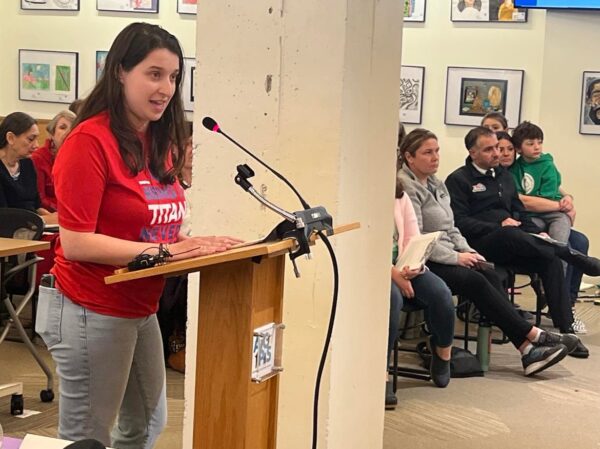
About 15% of ACPS teachers retired or quit last year, outpacing Arlington’s 9.5% and the national average, which is 8%, according to the Washington Post.
ACPS enrollment is projected to increase modestly from 15,732 students at the end of the current school year to 15,847 students at the beginning of the next school year in August 2023. Enrollment peaked at more than 16,000 students at the tail-end of the 2020-2021 school year — during the height of the pandemic — resulting in ACPS losing 474 students (3%).
But inaccurate enrollment projections have prompted frustration from some parents.
“This year’s enrollment numbers exceeded last year’s projections in the overwhelming majority of schools, including Brooks,” said Armita Cohen, the PTA president of Naomi L. Brooks Elementary School. “This resulted in larger classroom sizes in many grade levels, which made it harder for teachers to do their jobs. It continues to make it harder for students who are experiencing social and academic delays to catch up.”

Falk said that teachers are burned out, and that ACHS principals requested more than 20 new full time employees. Instead, five new full-time ACHS employees were funded in the budget. She and her colleagues are asking that the Board consider fully funding staffing requests from principals and that those funding requests be made public. They also want more instructional staff, counselors, and social workers. Lastly, they want two or three steps eliminated from the bottom of the salary scale, not just one.
“Just at Minnie Howard, we lost three of our four counselors,” Falk said. “We are burned out, overworked and overwhelmed… Is there a reason the superintendent’s budget did not include everything that school leadership is telling you they need?”
Kay-Wyatt did not attend the meeting, but previously acknowledged increased class sizes and staff burnout.
“That is a big challenge that we will continue to shine a spotlight on,” Kay-Wyatt said after presenting her budget earlier this month. “The national teacher and bus driver shortage and the highly competitive salaries that are offered in the D.C. Metro Area have to be addressed so that we can provide our students with a quality education. We must also work to address the many forms of trauma that our students face.”
The School Board is expected to pass the budget (with revisions) on Feb. 16, and it then goes to City Council before being approved as part of the city budget in early May.
Alexandria City Public Schools Interim Superintendent Melanie Kay-Wyatt says her budget will help address some of the long-term effects of the pandemic.
Kay-Wyatt’s theme for the budget is to “reset, restart and refocus” the school system, and she says employee retention is crucial.
“We hope the worst of the COVID-19 pandemic is in our rearview mirror,” Kay-Wyatt told the School Board. “But the challenges that it has left behind clearly need to be addressed.”
On Thursday, Kay-Wyatt presented her $359.9 million fiscal year 2024 combined funds budget proposal, and 85% of it is geared toward paying the salaries of more than 2,600 ACPS employees. Kay-Wyatt is proposing a 2.6% step increase and 2.5% market rate adjustment for eligible ACPS employees, as well as increased funding for Social and Emotional Learning programming (SEAL) for every student to regroup students coping with learning loss and other pandemic-related issues.
“We do know some of our challenges, of course, have been staff burnout,” Kay-Wyatt said. “We hear that from our staff, we hear that from our organization, and we are definitely focused on that as well.”
Kay-Wyatt continued, “That is a big challenge that we will continue to shine a spotlight on. The national teacher and bus driver shortage and the highly competitive salaries that are offered in the D.C. Metro Area have to be addressed so that we can provide our students with a quality education. We must also work to address the many forms of trauma that our students face.”
The budget is a 4% increase over last year’s approved budget, and includes funding to develop an official ACPS plan and policy for collective bargaining with employees.
Systemwide, ACPS enrollment is projected to increase modestly from 15,732 students at the end of the current school year to 15,847 students at the beginning of the next school year in August 2023. Enrollment peaked at more than 16,000 students at the tail-end of the 2020-2021 school year — during the height of the pandemic — resulting in ACPS losing 474 students (3%).
ACPS will conduct a public hearing on the proposed budget on Jan. 19. The School Board is expected to pass it (with revisions) on Feb. 16, and then go to City Council for deliberation until it passes the city’s budget in early May.

The Alexandria Police Department and local non-profits are getting a federal funding boost as part of the new omnibus funding bill.
Rep. Don Beyer (D) who represents the 8th District highlighted a few of the benefits to Alexandria in the FY 2023 omnibus bill approved on Friday.
According to Beyer:
Alexandria:
- $1,500,000 for the Alexandria City AHDC Arlandria Housing+ Project, a multi-phase, mixed-use project that will combine 475 units of affordable housing with commercial, retail, and community space
- $1,000,000 for Full Deployment of Body-Worn Cameras in Alexandria Police Department
- $1,500,000 on behalf of ALIVE!, Inc. for the Alexandria Community Food Resource Center
- $750,000 for the Notabene Drive, Four Mile Rd., and Old Dominion Blvd. Flood Mitigation Project, Arlandria
The $1.5 million to the Alexandria Housing Development Corporation (AHDC) is going to support a new housing project in the Arlandria-Chirilagua neighborhood.
The additional body-worn camera funding follows an earlier federal boost in grant funding for Alexandria’s body-worn camera program.
This bill has funding I secured for Arlington, Alexandria, Falls Church, and Fairfax County projects to make our community healthier, boost clean energy, strengthen our infrastructure, support affordable housing, feed the hungry, improve law enforcement transparency, and more. 2/ pic.twitter.com/GAjKnLvFju
— Rep. Don Beyer (@RepDonBeyer) December 23, 2022
Photo via Tony Webster/Flickr
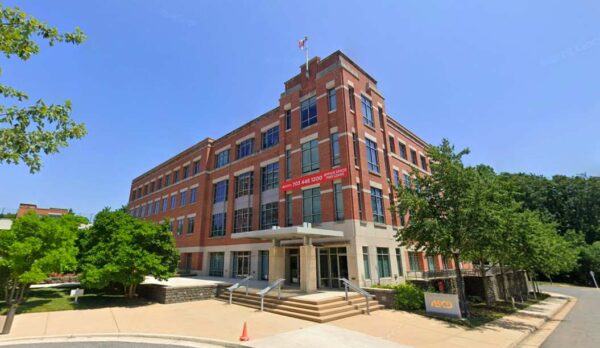
The Alexandria School Board approved its 2024-2033 Capital Improvement Program budget on Thursday night, paving the way for construction of new schools, swing space and significant renovations over the next decade.
After a series of work sessions and public meetings this fall, the Board approved the $461 million proposal, with $58.7 million to be used next year.
“It is critical that we give our students the best opportunity to succeed by providing optimal learning environments and the resources to support their well-being and academic achievement,” School Board Chair Meagan Alderton said in a press release.
The fiscal year 2024 CIP budget is $37 million less than last year’s approved proposal, although that’s only because the Alexandria City High School Project funding.
In fact, development costs have risen sharply. The school system is contending with price jumps up to 200%, ACPS reported.
Between last year and this year, cost estimates for the design and project management for the new George Mason Elementary School increased from $16 million to $17.4 million when the project begins in FY 2024. Construction estimates for the school have also jumped from $64 million to $82 million.
The budget also includes $5 million to retrofit the office building at 1703 N. Beauregard Street as swing space while George Mason and Cora Kelly School for Math, Science and Technology are completely rebuilt. George Mason students would transition to the swing space in fall 2024 and move into their new school in fall 2027, and Cora Kelly students would move to the swing space in fall 2027, and move into a newly built school in fall 2031.
The Capital Improvement Plan budget includes the following projects for FY 2024:
- $17.4 million for George Mason Elementary School design, project management and other construction costs
- $5.5 million for the renovation of the fifth and sixth floors of Ferdinand T. Day Elementary School
- $5.1 million for the retrofit of the swing space at 1703 N. Beauregard Street
- $5 million for repair work at William Ramsay Elementary School
- $2.5 million for renovations at Francis C. Hammond Middle School
- $2 million in transportation system upgrades
- $1.5 million for emergency repairs
- $1.3 million for renovations at George Washington Middle School
- $1.2 million for Alexandria City High School stadium renovations, security enhancements and stormwater improvements
- $1.2 million for textbook replacements
The CIP budget will be included in Interim Superintendent Melanie Kay-Wyatt’s proposed Fiscal Year 2024 budget to the Board next month. The School Board will approve the budget in February, and it then goes to City Council for final adoption in May.

